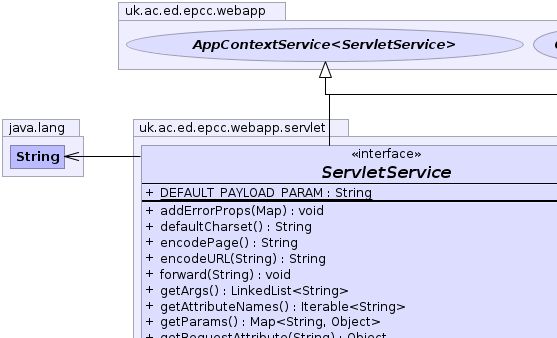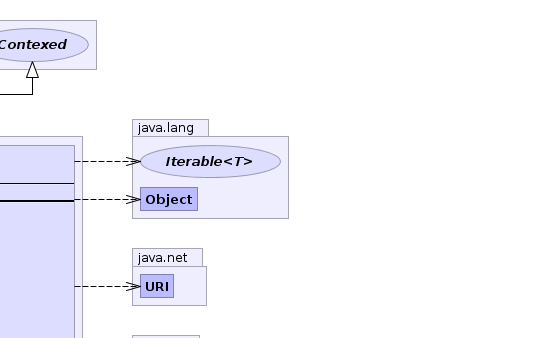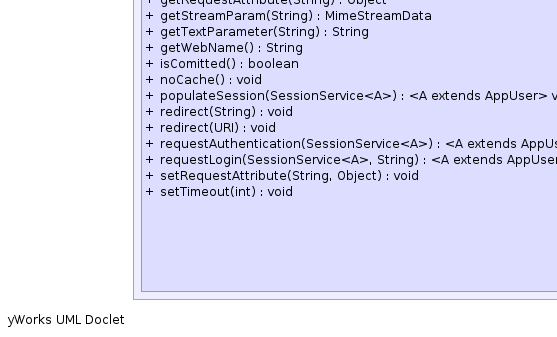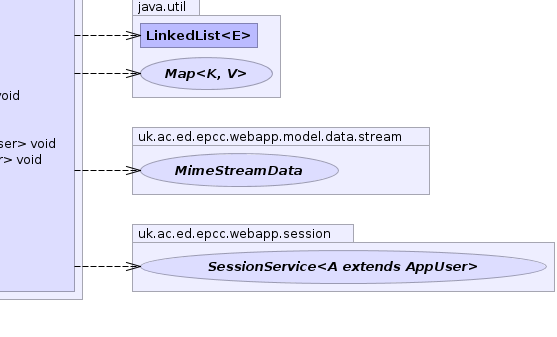-
- All Superinterfaces:
- AppContextCleanup, AppContextService<ServletService>, Contexed
- All Known Implementing Classes:
- DefaultServletService, MultiPartServletService, Servlet3MultiPartServletService
public interface ServletService extends AppContextService<ServletService>, Contexed
AnAppContextServiceused to access the servlet environment. This is intended to abstract logic that behaves differently in HttpServlet, Web-service and Portlet environments. The request/response objects are usually encapsulated in this object. These should not be exposed in the external interface as Portlets use different classes from servlets.
-
-
Field Summary
Fields Modifier and Type Field and Description static java.lang.StringDEFAULT_PAYLOAD_PARAM
-
Method Summary
All Methods Instance Methods Abstract Methods Default Methods Modifier and Type Method and Description voidaddErrorProps(java.util.Map props)Add additional information about the request to the properties of a debugging error report email.java.lang.StringdefaultCharset()Return the default charset we want to use.java.lang.StringencodePage()un-encoded version of the original request page.java.lang.StringencodeURL(java.lang.String url)Add the context path to a url pathvoidforward(java.lang.String url)Forward request to a different page.java.util.LinkedList<java.lang.String>getArgs()Get the ServletPath as a list of strings A path element of "-" terminates the list.java.lang.Iterable<java.lang.String>getAttributeNames()java.util.Map<java.lang.String,java.lang.Object>getParams()Extract a Map of the request parameters from the request.java.lang.ObjectgetRequestAttribute(java.lang.String name)Retrieve an object from the current request.default MimeStreamDatagetStreamParam(java.lang.String name)default java.lang.StringgetTextParameter(java.lang.String name)get a named paramter as a string This should include conversion f uplaoded files etc.java.lang.StringgetWebName()get the authenticated name for the current user as provided by the web-server/container authorisation layer.booleanisComitted()Has the response been comitted.voidnoCache()Identify the current request as containing sensative data that should not be cached.<A extends AppUser>
voidpopulateSession(SessionService<A> sess)Populate a session automatically using information from the request.voidredirect(java.lang.String url)Redirect request to a different page.voidredirect(java.net.URI uri)Redirect to an external URI This is intended for external URLs so session is never encoded<A extends AppUser>
voidrequestAuthentication(SessionService<A> sess)Authentication is required for this request but credentials are not available.<A extends AppUser>
voidrequestLogin(SessionService<A> sess, java.lang.String page)Go to the login page to request a login.voidsetRequestAttribute(java.lang.String name, java.lang.Object value)Store an object in the current requestvoidsetTimeout(int seconds)Set an inactivity timeout if supported-
Methods inherited from interface uk.ac.ed.epcc.webapp.AppContextService
getType
-
Methods inherited from interface uk.ac.ed.epcc.webapp.AppContextCleanup
cleanup
-
Methods inherited from interface uk.ac.ed.epcc.webapp.Contexed
getContext
-
-
-
-
Field Detail
-
DEFAULT_PAYLOAD_PARAM
static final java.lang.String DEFAULT_PAYLOAD_PARAM
- See Also:
- Constant Field Values
-
-
Method Detail
-
encodePage
java.lang.String encodePage()
un-encoded version of the original request page. * This uses a cached value because the request URL will be re-written if the request is forwarded to a different servlet/jsp.- Returns:
- String URL relative to context root.
-
encodeURL
java.lang.String encodeURL(java.lang.String url)
Add the context path to a url path- Parameters:
url-- Returns:
- String
-
forward
void forward(java.lang.String url) throws ServletException, java.io.IOExceptionForward request to a different page.- Parameters:
url- String page to forward to relative to the context path- Throws:
ServletExceptionjava.io.IOException
-
redirect
void redirect(java.lang.String url) throws java.io.IOExceptionRedirect request to a different page.- Parameters:
url- String page to forward to relative to the context path- Throws:
ServletExceptionjava.io.IOException
-
redirect
void redirect(java.net.URI uri) throws java.io.IOExceptionRedirect to an external URI This is intended for external URLs so session is never encoded- Parameters:
uri-- Throws:
java.io.IOException
-
getParams
java.util.Map<java.lang.String,java.lang.Object> getParams()
Extract a Map of the request parameters from the request. This is made a method on the ServletAppContext to allow access to logging/configuration and to allow the application specific customisation.- Returns:
- Map of parameters
- Throws:
DataFault
-
getTextParameter
default java.lang.String getTextParameter(java.lang.String name)
get a named paramter as a string This should include conversion f uplaoded files etc.- Parameters:
name-- Returns:
-
getStreamParam
default MimeStreamData getStreamParam(java.lang.String name) throws DataFault
- Throws:
DataFault
-
getArgs
java.util.LinkedList<java.lang.String> getArgs()
Get the ServletPath as a list of strings A path element of "-" terminates the list. This is to allow parameters to be passed on the path at the same time as an arguemnt path.- Returns:
- LinkedList
arguments in order.
-
getWebName
java.lang.String getWebName()
get the authenticated name for the current user as provided by the web-server/container authorisation layer. This will be null unless the container/web-server has authorisation turned on for this URL.- Returns:
- String webname
-
populateSession
<A extends AppUser> void populateSession(SessionService<A> sess)
Populate a session automatically using information from the request. This is invoked by theServletSessionServiceif a person is requested and the current person is not stored in the session. It handles authentication mechanisms that don't use a specific login url. If the session is not populated here it may trigger a call torequestAuthentication(SessionService)later. Any authentication errors could be cached in the request and handled there.- Parameters:
sess-SessionService
-
requestAuthentication
<A extends AppUser> void requestAuthentication(SessionService<A> sess) throws java.io.IOException, ServletException
Authentication is required for this request but credentials are not available. If possible this should request the client to re-send the request with correct authorisation. e.g. by redirecting to a login page or requesting basic authentication. The request could take account of authentication errors from an earlier call topopulateSession(SessionService). These can be cahce din the request. TheSessionServiceis provided as a parameter to be queried for its capabilities.- Parameters:
sess-SessionService- Throws:
java.io.IOExceptionServletException
-
requestLogin
<A extends AppUser> void requestLogin(SessionService<A> sess, java.lang.String page) throws java.io.IOException, ServletException
Go to the login page to request a login.- Type Parameters:
A-- Parameters:
sess-SessionServicepage- page to return to- Throws:
java.io.IOExceptionServletException
-
defaultCharset
java.lang.String defaultCharset()
Return the default charset we want to use.- Returns:
-
isComitted
boolean isComitted()
Has the response been comitted.- Returns:
-
addErrorProps
void addErrorProps(java.util.Map props)
Add additional information about the request to the properties of a debugging error report email.- Parameters:
props-
-
noCache
void noCache()
Identify the current request as containing sensative data that should not be cached.
-
getAttributeNames
java.lang.Iterable<java.lang.String> getAttributeNames()
-
setRequestAttribute
void setRequestAttribute(java.lang.String name, java.lang.Object value)Store an object in the current request- Parameters:
name-value-
-
getRequestAttribute
java.lang.Object getRequestAttribute(java.lang.String name)
Retrieve an object from the current request.- Parameters:
name-- Returns:
-
setTimeout
void setTimeout(int seconds)
Set an inactivity timeout if supported- Parameters:
seconds-
-
-



